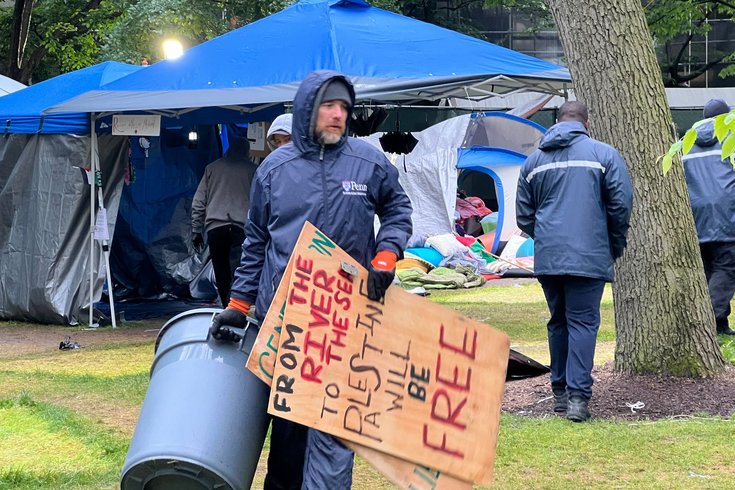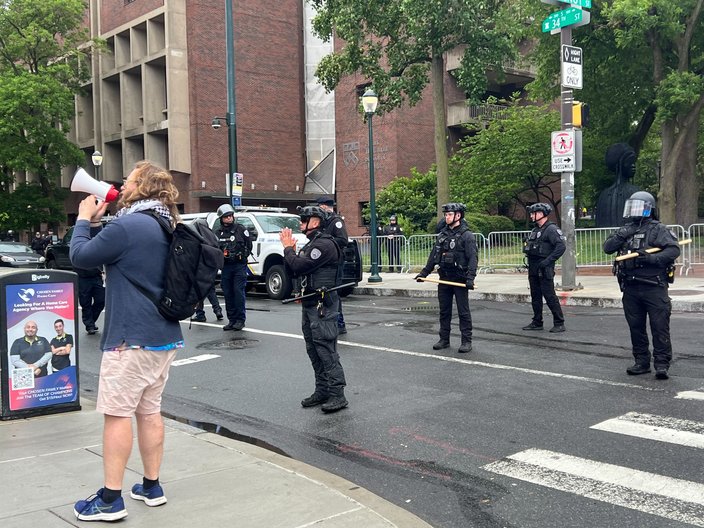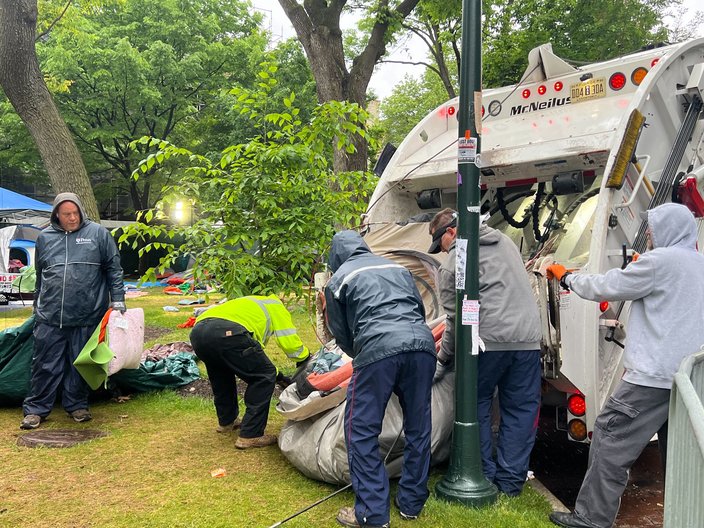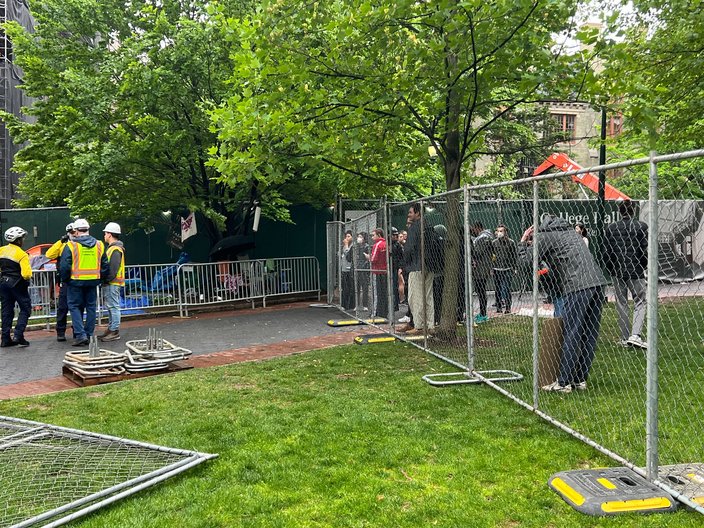
May 10, 2024
 Chris Compendio/PhillyVoice
Chris Compendio/PhillyVoice
A University of Pennsylvania worker carries a sign to a garbage truck as crews clear away remnants of the pro-Palestine encampment that had been on the school's College Green for the past two weeks. Friday morning police arrested 33 protesters and dismantled the encampment.
UPDATE (8:03 p.m.): The chair of the faculty senate at the University of Pennsylvania resigned from that board after Friday's decision by the college's leaders to dismantle the pro-Palestine encampment on College Green and arrest protesters who had been assembled for more than two weeks.
According to the Daily Pennsylvanian, political science professor Tulia Falleti submitted a her 3-page resignation letter to Penn's interim president J. Larry Jameson and provost John L. Jackson Jr.. In the letter she said she could no longer work "collaboratively with our administration that has sent in the police to arrest its own students, staff, and faculty for participating in a non-violent protest."
Falleti, who had led the faculty senate for the last two years, said the protest occupied a "tiny fraction" of Penn's campus and it did not disrupt the school's educational mission, except during the past couple days after Penn's leaders had stopped negotiating with the protesters and prepared to clear the encampment.
"If Universities such as Penn become one-sided, partisan, and biased, if they give in to external pressures for either political or financial reasons, then there is no hope for higher education in this country or the world<' Falleti wrote. "The larger threat is to democracy itself, because such manipulation of our rules, policies, and procedures can only take place in non-democratic institutions."
4:32 p.m.: Organizers of the pro-Palestinian protests responded Friday afternoon to the University of Pennsylvania administration's explanation for dismantling the encampment at College Green, calling it "lies."
On Instagram, the organizers reposted the university statement and addressed the points raised by Penn's leaders. Friday morning, after protesters were arrested and crews had begun disposing of the encampment's tents, signs and other items, a statement was emailed signed by Penn's interim president J. Larry Jameson, provost John L. Jackson Jr., Penn's provost, and senior executive vice president Craig R. Carnaroli.
Protest organizers dispute the university's claim that the encampment interfered with academic life in the weeks since it formed on April 24.
"We reject this attempt by university administration to foster division and push student frustration onto our cause," the post says. "Students were able to freely access their buildings and participate in commencement events."
The expansion of participation at the encampment had been a reflection of growing support, the organizers say, writing, "People answered the call — we must ask ourselves what compelled them to answer?"
They also claim that Penn's administration did not bring in outside facilitators to help when negotiations reached an impasse, despite Philadelphia District Attorney Larry Krasner and Pennsylvania state Rep. Rick Kajewski offering to act as intermediaries.
The response from organizers also disputed Penn's "viewpoint neutral" position in the conflict. They said the university's promises to help rebuild Gaza will be undermined by maintaining financial ties to companies that support and benefit from Israel's military campaign.
"The university cannot help rebuild Gaza while continuing to invest in companies that participate in the death and destruction of Palestinian life and academia ..." the organizers said.
2:25 p.m.: A virtual press conference featured speakers affiliated with Penn from various departments and schools reacting to the Friday morning arrests, characterizing the encampment as an "educational space" and criticizing the administration's response.
Huda Fakhreddine, an associate professor of Arabic literature and member of Faculty for Justice in Palestine (FJP), claimed that the university "violated its own policies" and continued calls for disclosure of the university's financial holdings.
Sukaina Hirji, an assistant professor of philosophy and also a member of FJP, spoke about how she conducted teach-ins at the encampment and said that the university made it "almost impossible" to conduct those discussions on campus. Hirji also announced that a rally would occur at the Love statue on Penn's campus at 3 p.m.
Other speakers echoed the statements from their colleagues. Amy Hillier, an associate professor at the School of Social Policy and Practice and a member of AAUP-Penn, described her "beautiful conversations with students" on campus and mentioned scenes of counter-protesters yelling at the encampment and writing "f**k Palestine" in chalk.
Radwa El Barouni of the university's Arabic Language Program and a member of the AAUP-Penn executive committee compared Penn's situation to those of other campuses, saying that other universities such as Brown, Rutgers and Trinity negotiated with protesters in good faith.
"The point of a university is to make space for conversations that challenge the status quo, and I think we all collectively failed in that mission today," said Hirji.
1:12 p.m.: Philadelphia Mayor Cherelle Parker said Friday afternoon that the police department "fulfilled its commitment" to provide requested support to Penn Police for their removal of the pro-Palestinian encampment on College Green this morning. The university had first asked for help from police on May 1.
"We were clear throughout that process that Philadelphia Police would provide backup assistance if arrests were made, or if the situation became dangerous or violent," Parker said in a joint statement with Public Safety Director Adam Geer and City Solicitor Renee Garcia. "We were also clear that we expected Penn to explore every option to resolve this matter peacefully."
City officials said they conducted outreach to protesters, Penn administrators and neutral parties in hopes of reaching an agreement. The city also provided civil disorder training to Penn Police over the course of three days earlier this week in case there was no resolution.
"As is now clear, an agreement was not reached, and the university made the decision to clear the encampment," the statement from the mayor's office said.
The Philadelphia Sheriff's Office provided buses for transporting the 33 protesters who were arrested and given code violation notices before their release.
"Thankfully, no one was injured during the encampment clearing," the statement said.
12:02 p.m.: Penn’s chapter of the American Association of University Professors and Penn faculty will hold a news conference at 1 p.m. to condemn the arrests of protesters and the disciplinary action toward six Penn students.
"Bowing to pressure from donors, politicians, and lobbying organizations that would like to control what can be taught and studied in the United States, and which have consistently misrepresented the character of a peaceful antiwar encampment, Penn’s administration has violated a core principle of academic freedom: the right of students to freedom in learning, which includes their right to assemble and engage in political activity," read a statement from AAUP-Penn.
The group accused the university's provost of abusing the student disciplinary system and claimed that the encampment complied with Penn's guidelines on open expression, calling for the university to reverse the mandatory leaves for the six students and drop the charges against those arrested.
The Instagram account of the Philly Palestine Coalition also shared a short video of arrested protesters reuniting and celebrating after police released them with code violation notices.
Philadelphia police close off the sidewalk at 34th and Walnut streets on the University of Pennsylvania campus Friday morning. Earlier, officers disbanded the pro-Palestine encampment that had been on College Green for more than two weeks.
10:45 a.m.: University of Pennsylvania interim president J. Larry Jameson called the removal of the pro-Palestinian encampment on College Green on Friday a necessary step to address "extraordinary circumstances" that had put the Penn community "under threat" for more than two weeks.
"The protestors refused repeatedly to disband the encampment, to produce identification, to stop threatening, loud, and discriminatory speech and behavior, and to comply with instructions from Penn administrators and Public Safety," Jameson said in an email to the Penn community sent at 9:27 a.m., not long after police in riot gear dismantled the encampment and arrested 33 protesters.
Access to the College Green area will be restricted to people with valid University of Pennsylvania IDs until further notice, the email states. Anyone without proper identification will be asked to leave or escorted off campus.
The email also was signed by John L. Jackson Jr., Penn's provost, and Craig R. Carnaroli, the university's senior executive vice president.
Jameson said he and other leaders at Penn had hoped to reach a different resolution with the demonstrators, who had expanded the encampment since it began on April 24.
"Despite diligent efforts to find a path forward, the gap between the positions of many in the encampment and the University proved too wide to bridge in this volatile environment," Jameson said.
The university remains "unequivocally opposed" to divestment from organizations and businesses tied to Israel, Jameson said, and will not offer disciplinary amnesty to students and faculty who participated in the encampment.
The Philly Palestine Coalition, one of several organizations involved in the encampment, said Friday morning that its actions at Penn aren't finished.
"It was a beautiful encampment for the 17 days it lasted," the group said in an Instagram post. "And if Penn thinks this is the end, they need to think some more."
Penn officials called the removal of the encampment "viewpoint neutral" and said the university still hopes to use its resources to support rebuilding and scholarly programs in Gaza, Israel and elsewhere in the Middle East.
"There are times when our abiding commitment to open expression requires balancing free speech with our responsibility to safety, security, and continuing the operations of the University," Jameson said. "This is one of those times and why we have acted."
Police in riot gear arrived at the University of Pennsylvania on Friday morning to clear out the pro-Palestinian encampment that had been on College Green for more than two weeks and a group of protesters was arrested.
"At approximately 5:30am this morning, Penn Police, with support from the Philadelphia Police Department, took steps to remove the unauthorized encampment on College Green," according to a statement from Penn. "Protestors were given multiple warnings that they were trespassing and offered the opportunity to voluntarily leave and avoid citation. Those who chose to stay did so knowing that they would be arrested and removed. Approximately 33 individuals were arrested without incident and cited for defiant trespass."
Garbage trucks were used to help clear out tents and signs from the pro-Palestine encampment on College Green at the University of Pennsylvania on Friday.
Garbage trucks arrived at College Green as Penn workers disposed of tents and signs. Police erected a 6-foot-tall fence on Woodland Walk, west of College Green, and closed off the area surrounding College Hall and the Van Pelt-Dietrich Library Center.
Fences were put up Friday at Penn to block protesters from College Green, where an encampment was being cleared out.
Pro-Palestinian organizations in Philly are calling for protesters to mobilize in front of the 19th Police District station, where police took arrested demonstrators.
Councilmember Jamie Gauthier and state Rep. Rick Krajewski, who both represent the University of Pennsylvania and the surrounding community and are Penn alumni, released a joint statement.
"We are disappointed that riot police dismantled a peaceful student-led protest this morning," they said. "From the start, we advocated for a negotiated, nonviolent resolution. Sending a large militarized police force against students and faculty is an inappropriate and deeply concerning response.
"We are glad that the City only plans to issue (code violation notices) to those arrested, and urge that Penn not escalate this situation further by disciplining their students and faculty."
The university had called several times for the encampment's disbandment, a demand that Gov. Josh Shapiro echoed Thursday at an event. Earlier Thursday, Penn said it had issued mandatory leaves of absence to six students who violated university policy during the encampment.
Penn also announced new safety protocols for the commencement ceremony on Monday, May 20, at Franklin Field, saying guests will have to go through an "airport-style security screening" to enter the stadium.
"Penn continues to focus on the safety of our campus, including expanding security presence in response to the expansion of the encampment, despite our efforts to resolve this situation," according to a university statement. The announcement ended by acknowledging that security procedures "may change as conditions warrant."
 Chris Compendio/PhillyVoice
Chris Compendio/PhillyVoice Chris Compendio/PhillyVoice
Chris Compendio/PhillyVoice